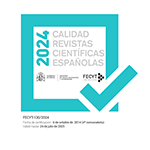¿Por qué nació la juntura «Tradición Clásica»? Razones historiográficas para un concepto moderno
Resumen
The term «Classical Tradition» is a join of historiographical nature. It was thought mainly to signify a kind of relationship («a in b») between the Ancient and the Modern literatures, as far as the first ones were understood as an object of study different from the second ones. At the beginning, the terms of «tradition» and «traditional studies» were referred, by default, to the educated field of the Greek-Latin heritage. However, in a certain moment it was necessary to fix the adjective «classical», because of the progress of the studies on the new both folk and modern traditions. The old adjective «classical», a metaphor taken from the social field to point out the best authors in an idealistic and timeless literary republic, added a historical dimension to its aesthetic meaning: the classical literatures and languages, as a category referred to the Greek and Roman Antiquity. Likewise, the meaning of this adjective was restricted in opposition to «modern», «Christian» and «folk».Descargas
Descarga artículo
Licencia
La revista Cuadernos de Filología Clásica. Estudios Latinos, para fomentar el intercambio global del conocimiento, facilita el acceso sin restricciones a sus contenidos desde el momento de su publicación en la presente edición electrónica, y por eso es una revista de acceso abierto. Los originales publicados en esta revista son propiedad de la Universidad Complutense de Madrid y es obligatorio citar su procedencia en cualquier reproducción total o parcial. Todos los contenidos se distribuyen bajo una licencia de uso y distribución Creative Commons Reconocimiento 4.0 (CC BY 4.0). Esta circunstancia ha de hacerse constar expresamente de esta forma cuando sea necesario. Puede consultar la versión informativa y el texto legal de la licencia.








